
Related
Topics
World leaders are hailing the International Atomic Energy Agency and its chief Mohamed ElBaradei for their efforts to stop the spread of nuclear weapons. But a number of environmental groups and activists are asserting that the IAEA has actually heightened the threat of nuclear war by promoting nuclear power. We host a debate between former Clinton official Nancy Soderberg and British writer George Monbiot. [includes rush transcript]
On Friday, the International Atomic Energy Agency and its chief Mohamed ElBaradei were awarded the 2005 Nobel Peace Prize for their efforts to stop the spread of nuclear weapons. The Egyptian-born ElBaradei has served as Director General of the IAEA since 1997. Speaking to reporters in Vienna soon after the announcement, he called the prize a “shot in the arm” for the agency. ElBaradei won the prize just months after the United States tried to force him from his job after the Bush administration repeatedly clashed with him over Iraq, Iran and North Korea. In the run-up to the Iraq war, ElBaradei argued that nuclear experts had found no weapons of mass destruction in Iraq. He called the launch of the US-led invasion “the saddest day of my life.” Leaders from across the globe have come forward in support of the Nobel peace committee’s selection of El Baradei and the IAEA. This is UN Secretary General Kofi Annan.
But not everyone has supported El Baradei and the IAEA. A number of environmental groups and activists are criticizing the Nobel Peace Prize committee for their selection. The French group, Sortir du Nucleaire–or Get Out of Nuclear–criticized the IAEA for “promoting” civilian nuclear plants. Meanwhile, Greenpeace was also critical of the selection.
- George Monbiot, Author and columnist for the London Guardian.
- Nancy Soderberg, She held senior positions on the National Security Council staff, and the U.S. delegation to the U.N., during the Clinton administration. She is author of the book, “The Superpower Myth, The Use and Misuse of American Might.”
Transcript
AMY GOODMAN: This is U.N. Secretary General Kofi Annan.
KOFI ANNAN: I think it’s a message for all of us that we should take the issue of non-proliferation and disarmament very, very seriously.
AMY GOODMAN: But not everyone has come in support of ElBaradei and the International Atomic Energy Agency. A number of environmental groups and activists are criticizing the Nobel Peace Prize committee for their selection. The French group, Sortir de Nucleaire, or Get Out of Nuclear, criticized the International Atomic Energy Agency for what they called “promoting” civilian nuclear plants. Meanwhile, Greenpeace was also critical of the selection.
JAN VANDE PUTTE: We’re really shocked, because the atomic agency has been responsible for over 50 years to promote the spread of nuclear technology. And this is the cause of the spread of nuclear weapons. Every country with a nuclear reactor has enough plutonium every year to produce about 30 nuclear weapons. So there is a direct link between nuclear power and nuclear bombs.
AMY GOODMAN: Jan Vande Putte of Greenpeace. To talk more about the selection of Mohamed ElBaradei and the IAEA for the Nobel Peace Prize, we’re joined by two guests: George Monbiot, author and columnist for the London Guardian joins us on the line from Britain, and on the line from Florida, Nancy Soderberg. She held senior positions in the National Security Council staff of President Clinton and the U.S. delegation to the U.N. She’s author of the book, The Superpower Myth: The Use and Misuse of American Might. Well, let’s begin with Nancy Soderberg. Why do you think the IAEA and its chief are a good choice for this year’s Nobel Peace Prize? And welcome.
NANCY SODERBERG: I think it’s a brilliant choice, because at a time when the Bush administration has been undermining virtually the entire alphabet soup of arms [inaudible], and it sends a strong message of the importance of that. And the head, Dr. Mohamed ElBaradei, deserves great credit for transforming what was a very sleepy, useless organization during the Cold War into a real force for change.
AMY GOODMAN: George Monbiot, your thoughts?
GEORGE MONBIOT: Well, I think the man from Greenpeace was largely right. While it is true that ElBaradei has stood up to the United States and to the United Kingdom, who have both done their best to wreck the nuclear Non-Proliferation Treaty, he has not stood up to the fundamental contradiction within that treaty and the fundamental contradiction within his role, which is that he is simultaneously charged with stopping the spread of military nuclear technology and facilitating the spread of civil military technology.
When you stop to consider that all the new nuclear states or attempted nuclear states have achieved their nuclear status by transforming their civil nuclear programs into military nuclear programs, you realize that with the one hand, he has been quite effectively trying to prevent proliferation, and on the other hand, he’s been even more effectively helping proliferation. And the fact that he has never publicly stood up and said there is a real problem with this role, there is a fundamental contradiction in the mandate of the IAEA and a fundamental contradiction in the nuclear Non-Proliferation Treaty, means that he has unfortunately done more harm than good during his tenure.
AMY GOODMAN: Nancy Soderberg, your response?
NANCY SODERBERG: Yeah, I mean, I think the — I have the utmost respect for Greenpeace and those who around the world are advocating nuclear disarmament, which is a goal that’s probably decades away from even being seriously talked about. I think the Clinton administration had that goal. Previous presidents have had that goal. I think this particular administration is trying to create new nuclear weapons, not trying to move forward towards disarmament.
But ElBaradei has to deal with the real world. And the real world today is that there is an increasing number of civilian nuclear plants around the world, and he’s trying to work to make sure that any nuclear technologies are contained, controlled, and inspected. He’s been trying to get Brazil, for instance, to allow inspectors in there. He’s working on the cutting edge of trying to push Iran back from the brink of a nuclear weapon. So he’s trying to swim against the tide of nuclear proliferation. I don’t think it’s a dual role at all. I think his job is to try and recognize reality, that there are civilian plants, let’s keep them civilian uses of nuclear energy and make sure that there is total control over nuclear weapons.
He’s put forward a couple of years ago a very interesting proposal to create centers of international inspection for any civilian plant so that the dangerous materials that are the waste from some of the civilian nuclear plants will be maintained and kept away from rogue states, new nuclear weapons states and, perhaps most importantly, terrorists.
And I think you also have to look at the context in which this award was given. This is a man who against great international pressure stood up to the United States and said, 'Actually, there are no nuclear weapons in Iraq.' Opposed the invasion. He’s been on the cutting edge of trying to get a more responsible stance from Washington in trying to create a carrot and stick approach in Iran and, in fact, the Bush administration has essentially adopted that program, too little, too late, so there is now a much tougher regime in Iran. But I think this is a man who has greatly advanced the cause of proliferation against great odds and deserves great credit for it.
AMY GOODMAN: George Monbiot
GEORGE MONBIOT: Nancy, with respect, I feel you haven’t addressed my point. The point I’m making is that part of the reason why there has been a great increase in civil nuclear facilities, which could be turned into military nuclear facilities, is that the organization which Mr. ElBaradei runs is actually charged with increasing the proliferation of civil nuclear facilities. One of his official roles is to spread so-called “Atoms for Peace” and encourage countries to adopt civil nuclear technology and indeed encourage the official nuclear powers to give that civil nuclear technology to the non-nuclear powers.
And partly as a result of the efforts of the IAEA and the Non-Proliferation Treaty, every state — Israel, South Africa, India, Pakistan, North Korea and Iraq — which has sought to develop a nuclear weapons program over the past thirty years has done so by diverting sources from its nuclear power program, and that nuclear power program, in most of those cases, has been promoted and developed by the IAEA. If you look, for example, at what’s happened in India, as a result of the brokerage by the IAEA, Canada, the United States, Germany, France, Norway and the United Kingdom provided India with all the materials it needed to develop its nuclear bombs. Similarly, in Pakistan, Canada, U.S., Germany, France, Belgium, China, and the United Kingdom, again, provided all the materials they required to develop their nuclear bombs. And it’s ElBaradei who has been going around the world saying, 'Hey, we can put you together with these countries which have got nuclear materials. They can help you develop a civil nuclear facility.' And then a few years later he turns around and says, 'Oh, my gosh! You have used a civil nuclear facility to produce nuclear weapons. Well, that's very unfortunate, and you really shouldn’t be doing it.’ He has actually been spreading proliferation.
NANCY SODERBERG: Well, I think, I mean —
AMY GOODMAN: Nancy Soderberg.
NANCY SODERBERG: You’re greatly exaggerating the role of the IAEA and these efforts by most of the countries that you mentioned to seek access to technology for nuclear power energies. And we can have a debate about whether nuclear energy should be eliminated from the face of the earth. I don’t think that that’s a realistic proposal. We have nuclear energy plants, and we’re going to have nuclear energy plants for the foreseeable future —
GEORGE MONBIOT: But, Nancy, would you deny that as those plants are spread around the world.
NANCY SODERBERG: So the question here is on the large picture of trying to reign in the threat of nuclear proliferation, the IAEA has done an extraordinary job of trying to contain those civilian plants from diverting nuclear weapons into — nuclear weapons products into weapons.
Just take, for instance, the role that they’re playing right now with Iran. They have been pressing for some kind of approach in Iran that had some chance of realism towards it. And for, you know, the last four-and-a-half years the Bush administration has been saying we don’t do carrots, we’re not going to push this. They followed the same proposal towards the North Korean program. Meanwhile, both countries are beginning — North Korea is just sitting there churning out two types of nuclear weapons. Iran is marching merrily towards a weapons production capability. And we have yet to put forward a proposal until recently where the Europeans and the Bush administration came together and put forward a proposal. It’s now been referred to the Security Council and the IAEA will be smack in the middle of these negotiations. It’s very late. You have a harder line regime now in Iran. So I think it’s going to be very difficult there.
But this come at a time the IAEA is looking at the current threats today, and the efforts of the Nobel Peace Prize to recognize that those were not a fight about the civilian issues of nuclear energy, but on the cutting edge of the threats that we face today, which are Iran, North Korea, what was going on in Iraq, and trying to maintain international control over the many nuclear power plants around the world, which are a fact of life.
AMY GOODMAN: Nancy Soderberg, I wanted to ask you a question. Holding senior positions on the National Security Council staff of President Clinton, you talked about how ElBaradei had from the beginning said that Iraq didn’t have nuclear weapons, Mohamed ElBaradei calling the launch of the U.S.-led invasion the saddest day of his life. And, yet, the whole Democratic establishment in this country — I mean the establishment, the core of it, Senator Hillary Rodham Clinton here in New York, John Kerry, John Edwards, the presidential candidate and vice-presidential candidate of the Democratic Party, all voted to authorize the invasion. What were your thoughts on that?
NANCY SODERBERG: Well, at the time, I think there was a general consensus that Iraq had chemical and biological weapons, because he had never accounted for those that we knew he had at the end of the 1991 Gulf War.
AMY GOODMAN: You’re saying ElBaradei himself was saying it was the saddest day of his life. He was saying, no, the man that, you know, you’re applauding now. So why didn’t the Democratic establishment support that at the time?
NANCY SODERBERG: There was a general consensus on the chemical and biological weapons which turned out to be wrong. But I think the Bush administration blatantly was putting forward false information that he had nuclear weapons and, you know, that whole famous Joe Wilson trip that whether or not they acquired those efforts from Nigeria. But there was a misinformation campaign on the nuclear side from the Bush administration that those who followed it very closely, like myself, I was in the administration up until 2001, generally felt that they did not have nuclear weapons. And ElBaradei was one of the few international folks actually to stand up and say, 'No, in fact, they do not have nuclear weapons.' So there’s a gray area on the chemical and biological weapons. But ElBaradei turned out to be, you know, quite right. I have the quote right here. He said, “No evidence or plausible indication of a revival of the nuclear weapons program in Iraq.”
AMY GOODMAN: And yet, it was the nuclear weapons that were the most frightening and the most often cited in the U.S. Congress when the Congress members and Senators stood up in support of the invasion. It was the threat of the nuclear mushroom. Yet, you had these people like ElBaradei. Why weren’t they taken seriously at the time?
NANCY SODERBERG: Well, I think that the Democrats here are having a hard time justifying their stance on the position, other than to say that they were under the impression that the threat was imminent from the President of the United States. And they believe that President has the right to make that decision. I think there is a lot of Democrats sort of scratching their head on that point right now. But I think at the time Democrats were not standing up to President Bush.
And I think you also have to remember this is right after 9/11. The whole country was in a bit of a fetal position after that and is only now emerging to sort of challenge what’s going on. That’s why the morass of Katrina and those others is sort of a wake-up call to the rest of the country that, hey, wait a minute, these guys may not be as competent as they have claimed to be over the last four-and-a-half years. And I think you’re seeing the removal of the rose-colored glasses that have been on most of the eyes of many of our country’s leaders. And the press, as well. And they’re beginning now to finally questioning the competency of this administration.
AMY GOODMAN: George Monbiot?
GEORGE MONBIOT: Well, I do think the Democrats have been completely pathetic. And in the run-up to the war with Iraq, it was very striking that large numbers of people on both sides of the Atlantic could see that Bush was lying. They could see that there was no threat from Saddam Hussein, nuclear, chemical, or biological. They could see that even if he possessed chemical or biological weapons he had no intention and no means of attacking the West with those weapons.
And the sense of intense frustration with both the Democratic Party in the United States and the Labour Party in the United Kingdom was palpable among liberal people on both sides of the Atlantic. And it was a perpetual mystery to us why our supposed representatives, the people whom we had elected to represent our views, could not see the very obvious things that the rest of us could see. And it seemed to us that they had been mesmerized and bamboozled by Bush and by Blair, and that they had quite willingly and deliberately accepted their lies. And I still feel an enormous amount of resentment towards the Labour Party as a whole over here and the Democrat Party as a whole in the United States.
AMY GOODMAN: We’re going to have to leave it there. I want to thank you both very much for being with us. George Monbiot is author of Manifesto for a New World Order, and Nancy Soderberg, a high-level Clinton administration official in the National Security Council and also on the U.N. staff.

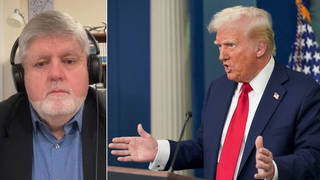
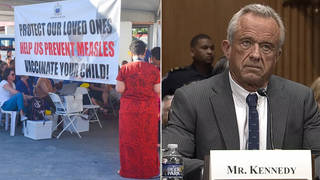
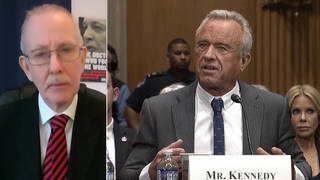
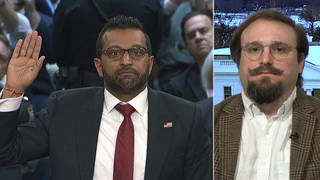






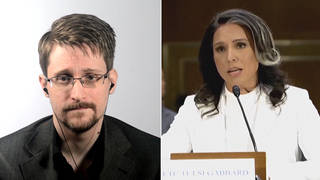
Media Options